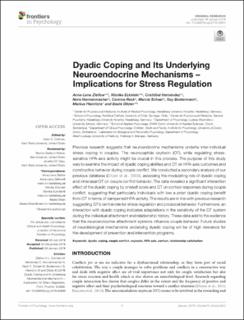Bitte benutzen Sie diese Kennung, um auf die Ressource zu verweisen:
https://doi.org/10.21256/zhaw-4369| Publikationstyp: | Beitrag in wissenschaftlicher Zeitschrift |
| Art der Begutachtung: | Peer review (Publikation) |
| Titel: | Dyadic coping and its underlying neuroendocrine mechanisms : implications for stress regulation |
| Autor/-in: | Zietlow, Anna-Lena Eckstein, Monika Hernández, Cristóbal Nonnenmacher, Nora Reck, Corinna Schär Gmelch, Marcel Bodenmann, Guy Heinrichs, Markus Ditzen, Beate |
| DOI: | 10.3389/fpsyg.2018.02600 10.21256/zhaw-4369 |
| Erschienen in: | Frontiers in Psychology |
| Band(Heft): | 9 |
| Heft: | 2600 |
| Erscheinungsdatum: | 9-Jan-2019 |
| Verlag / Hrsg. Institution: | Frontiers Research Foundation |
| ISSN: | 1664-1078 |
| Sprache: | Englisch |
| Schlagwörter: | Dyadic coping; Couple conflict; Oxytocin; HPA-axis; Cortisol; Relationship satisfaction |
| Fachgebiet (DDC): | 158: Angewandte Psychologie 610: Medizin und Gesundheit 616.89: Psychische Störungen, klinische Psychologie und Psychiatrie |
| Zusammenfassung: | Previous research suggests that neuroendocrine mechanisms underlie inter-individual stress coping in couples. The neuropeptide oxytocin (OT), while regulating stresssensitive HPA-axis activity might be crucial in this process. The purpose of this study was to examine the impact of dyadic coping abilities and OT on HPA-axis outcomes and constructive behavior during couple conflict. We conducted a secondary analysis of our previous database (Ditzen et al., 2009), assessing the modulating role of dyadic coping and intranasal OT on couple conflict behavior. The data revealed a significant interaction effect of the dyadic coping by oneself score and OT on cortisol responses during couple conflict, suggesting that particularly individuals with low a priori dyadic coping benefit from OT in terms of dampened HPA-activity. The results are in line with previous research suggesting OT’s central role for stress regulation and prosocial behavior. Furthermore, an interaction with dyadic coping indicates adaptations in the sensitivity of the OT system during the individual attachment and relationship history. These data add to the evidence that the neuroendocrine attachment systems influence couple behavior. Future studies of neurobiological mechanisms underlying dyadic coping will be of high relevance for the development of prevention and intervention programs. |
| Weitere Angaben: | This article was submitted to Clinical and Health Psychology, a section of the journal Frontiers in Psychology |
| URI: | https://digitalcollection.zhaw.ch/handle/11475/14460 |
| Volltext Version: | Publizierte Version |
| Lizenz (gemäss Verlagsvertrag): | CC BY 4.0: Namensnennung 4.0 International |
| Departement: | Angewandte Psychologie |
| Organisationseinheit: | Institut für Angewandte Psychologie (IAP) |
| Enthalten in den Sammlungen: | Publikationen Angewandte Psychologie |
Dateien zu dieser Ressource:
| Datei | Beschreibung | Größe | Format | |
|---|---|---|---|---|
| 2019_Schaer_Marcel_Dyadic_coping_and_its_underlying_neuroendocrine_mechanisms.pdf | 675.87 kB | Adobe PDF |  Öffnen/Anzeigen |
Zur Langanzeige
Zietlow, A.-L., Eckstein, M., Hernández, C., Nonnenmacher, N., Reck, C., Schär Gmelch, M., Bodenmann, G., Heinrichs, M., & Ditzen, B. (2019). Dyadic coping and its underlying neuroendocrine mechanisms : implications for stress regulation. Frontiers in Psychology, 9(2600). https://doi.org/10.3389/fpsyg.2018.02600
Zietlow, A.-L. et al. (2019) ‘Dyadic coping and its underlying neuroendocrine mechanisms : implications for stress regulation’, Frontiers in Psychology, 9(2600). Available at: https://doi.org/10.3389/fpsyg.2018.02600.
A.-L. Zietlow et al., “Dyadic coping and its underlying neuroendocrine mechanisms : implications for stress regulation,” Frontiers in Psychology, vol. 9, no. 2600, Jan. 2019, doi: 10.3389/fpsyg.2018.02600.
ZIETLOW, Anna-Lena, Monika ECKSTEIN, Cristóbal HERNÁNDEZ, Nora NONNENMACHER, Corinna RECK, Marcel SCHÄR GMELCH, Guy BODENMANN, Markus HEINRICHS und Beate DITZEN, 2019. Dyadic coping and its underlying neuroendocrine mechanisms : implications for stress regulation. Frontiers in Psychology. 9 Januar 2019. Bd. 9, Nr. 2600. DOI 10.3389/fpsyg.2018.02600
Zietlow, Anna-Lena, Monika Eckstein, Cristóbal Hernández, Nora Nonnenmacher, Corinna Reck, Marcel Schär Gmelch, Guy Bodenmann, Markus Heinrichs, and Beate Ditzen. 2019. “Dyadic Coping and Its Underlying Neuroendocrine Mechanisms : Implications for Stress Regulation.” Frontiers in Psychology 9 (2600). https://doi.org/10.3389/fpsyg.2018.02600.
Zietlow, Anna-Lena, et al. “Dyadic Coping and Its Underlying Neuroendocrine Mechanisms : Implications for Stress Regulation.” Frontiers in Psychology, vol. 9, no. 2600, Jan. 2019, https://doi.org/10.3389/fpsyg.2018.02600.
Alle Ressourcen in diesem Repository sind urheberrechtlich geschützt, soweit nicht anderweitig angezeigt.